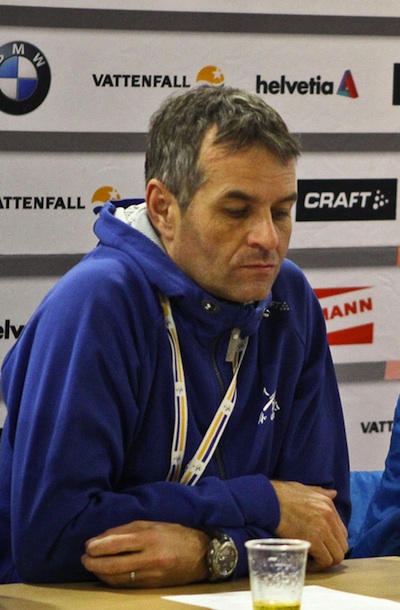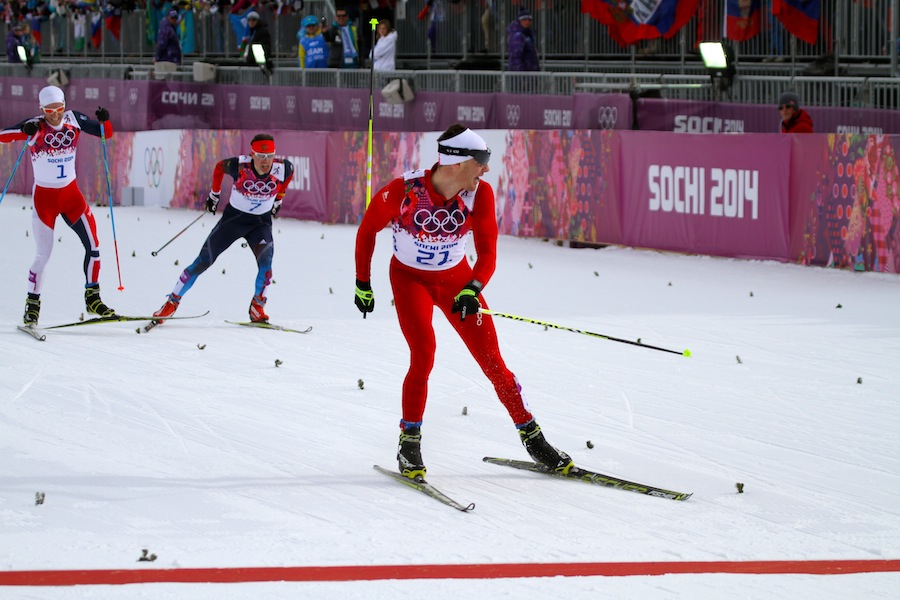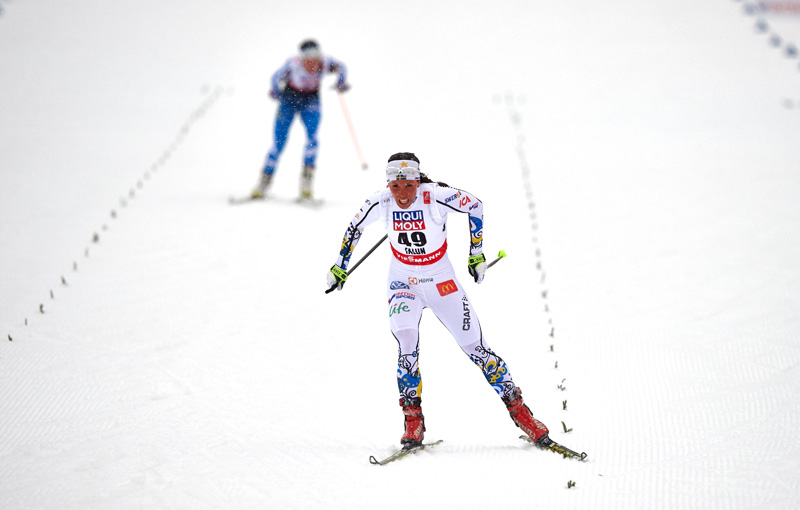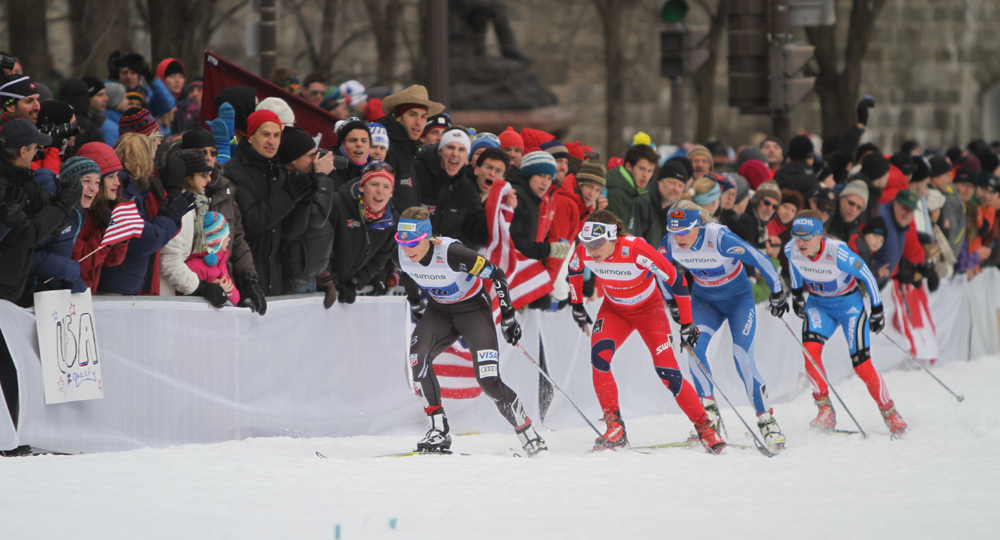
Excitement is rising in North America for the Ski Tour Canada, a series of eight World Cup cross-country ski races scattered across the country in 2016. And a number of international superstars have announced their intentions to participate in the series.
But one big name in the ski world is less than enthusiastic: Jürg Capol. The director of marketing for the International Ski Federation’s nordic sector, Capol voiced doubts to Norwegian website Sporten.com.
“It’s silly,” he said, according to a translation. “It is from Europe that you generate great television revenues.”
Does it have to be so? Not necessarily. Dave Dyer, the director of events for Cross Country Canada (CCC), doesn’t agree with Capol’s perspective.
“It’s tough to read into his comments in terms of the context of the overall conversation and whether it accurately reflects his views,” Dyer said in an interview with FasterSkier on Friday. “But I think we’re stating the obvious when we say that ski events, whether they are cross-country, alpine, or biathlon or nordic combined, held in North America, can hit the prime targets of European television.”

The Lake Louise downhill, one of the international federation’s major alpine events, is broadcast to over 100 million people globally from western Canada.
In February, more than 800 million viewers globally tuned in to FIS Alpine World Championships in Vail/Beaver Creek, Colo.
“It’s more of a challenge from a television perspective, not saying whether that is good or bad,” Dyer said. “I think we actually have quite good positioning from a television perspective – we are aligned with coverage of the biathlon World Championships, so I think that will garner us a big profile in Europe.”
Yet one of Capol’s major criticisms is that the Ski Tour Canada would be good only for the home country.
“Tour de Canada is an ending for the World Cup,” Capol told Sporten.com. “It is not known whether it will be good for Canada, or for Norway. There are not so many places who will broadcast it live because of the time difference between Canada and Central and Northern Europe. It’s hard to get on the program then. So you lose. The concept is perhaps to some extent good for Canada alone, yet we do not know whether there will be a ‘next time’.”
One obvious missing piece is that not only will the event be good for Canadian skiing, but also for American skiing. The last FIS World Cups hosted in Quebec in particular were easily accessible to American spectators living in the Northeast, and the broadcasts generated interest and excitement.

Between Americans and Canadians, four men and six women were ranked in the top 30 of the World Cup in either distance or sprinting, and three different skiers medaled at 2015 World Championships.
And in fact, FIS has been pushing for increased success from a variety of nations, especially given the near-total dominance of Norwegian women in the last season.
“Over the last few years the tendency is a dominance of the two or three biggest nations,” FIS Cross-Country Race Director Pierre Mignerey said in May. “I’m not concerned with a temporary dominance of one nation but in the long term this is a danger for our discipline. The best possible life insurance for Cross-Country skiing is to have a larger number of countries at the highest level.”
Thus a focus on North America does not seem unwise.
“From a spectator perspective here in North America, they were fabulously successful,” Dyer said of the last World Cups to be held in Canada in December 2012. “I think that being the World Cup final for the 2015/2016 season, the Ski Tour will be equally as exciting and people will be equally interested.”
The success of those events made it easier to market the Ski Tour Canada, he said.
“Any time we do a city sprint, now that we have some examples under our belts, we have good television and print media coverage,” he explained. “Those events sell very very well whether we are selling to our public partners or whether we are selling to the corporate sector.”
Finally, Capol expressed doubt that top skiers would attend the Canadian races, and asserted that the success of television broadcasts in Europe depended on them doing so.
“This is hard to sell,” Capol said. “In Canada cross-country skiing is a little sport… I know that media revenues are low. Going 25 percent of all distances at the World Cup in Canada… It depends on the runners going. If Justyna Kowalczyk is in good shape maybe it gets a little more. From Germany there is little interest.”
That may be partly due to the declining fortunes of German skiing. A traditionally strong media market for nordic sports, both German skiing and biathlon had less than successful 2014 Olympics. But the biathlon squad bounced back with Laura Dahlmeier, Franziska Preuss, and Simon Schempp breaking through to become major forces in 2015-2016 while Erik Lesser, Arnd Peiffer, and Franziska Hildebrand stayed their successful courses. By contrast, Nicole Fessel, Steffi Boehler, and Denise Herrman had strong seasons but are nowhere near challenging the Norwegian dominance in cross-country skiing.

For the Ski Tour Canada, basing marketability estimates on the number of top skiers who attended previous World Cups held in Canada, which were scheduled in December, might not be accurate. Many top athletes skipped those due to worries about preparation for the rest of the season. But in a year without a World Championships, having eight races in Canada means it will be tough to win the World Cup title without going there. That means the field will be totally different than in the December races in past seasons.
“We’ve received really, really positive initial indications of the number of teams that are coming over with their full squad,” Dyer said. “We know from looking at the World Cup series, that a serious skier can ill afford not to come to Canada in 2016. So we’re expecting a really high percentage of eligible athletes in the Red Group to be joining us. I’d suggest that unless an athlete is injured or sick, they’ll be here. They are the last races of the season so athletes are going to put whatever feelings of concern about fitness they have behind them and ski until they drop.”
It’s not just Dyer who is saying that. The sport’s best athletes seem to be prepared to do battle in Canada.
“The focus lies in the overall World Cup, meaning that the results at the at Ruka Triple, Tour de Ski and Ski Tour Canada must be very good, because here many World Cup points are up for grabs,” Swiss skier and 2008/2009 World Cup champion Dario Cologna recently told FIS’s own news service. “I am very much looking forward to the start of the new season.”
Sweden’s Charlotte Kalla has also been saying for months that she will race the tour.
“The Ski Tour Canada is a major event towards the end of the season,” Norwegian national team coach Egil Kristiansen told ABC Nyheter last week, implying that his top stars like Therese Johaug would compete. “There will be many World Cup points handed out there. Therefore it is an important competition, at least for those who will fight for crystal balls.”
Chelsea Little
Chelsea Little is FasterSkier's Editor-At-Large. A former racer at Ford Sayre, Dartmouth College and the Craftsbury Green Racing Project, she is a PhD candidate in aquatic ecology in the @Altermatt_lab at Eawag, the Swiss Federal Institute of Aquatic Science and Technology in Zurich, Switzerland. You can follow her on twitter @ChelskiLittle.



